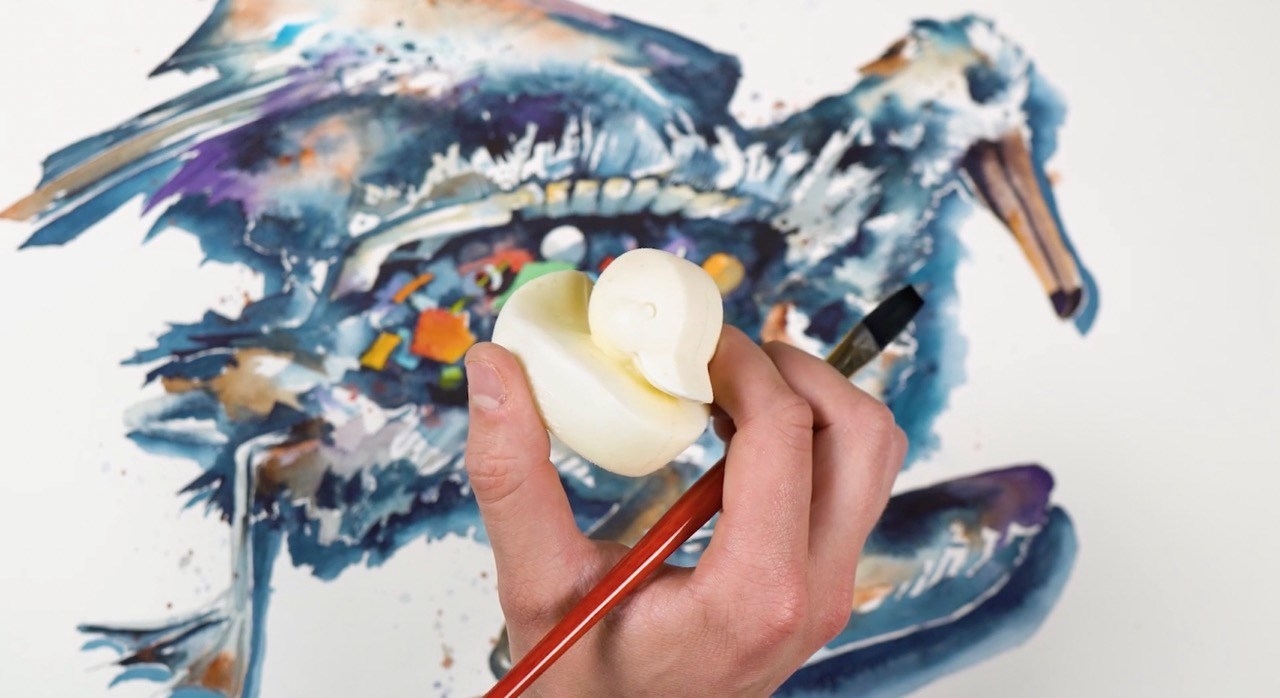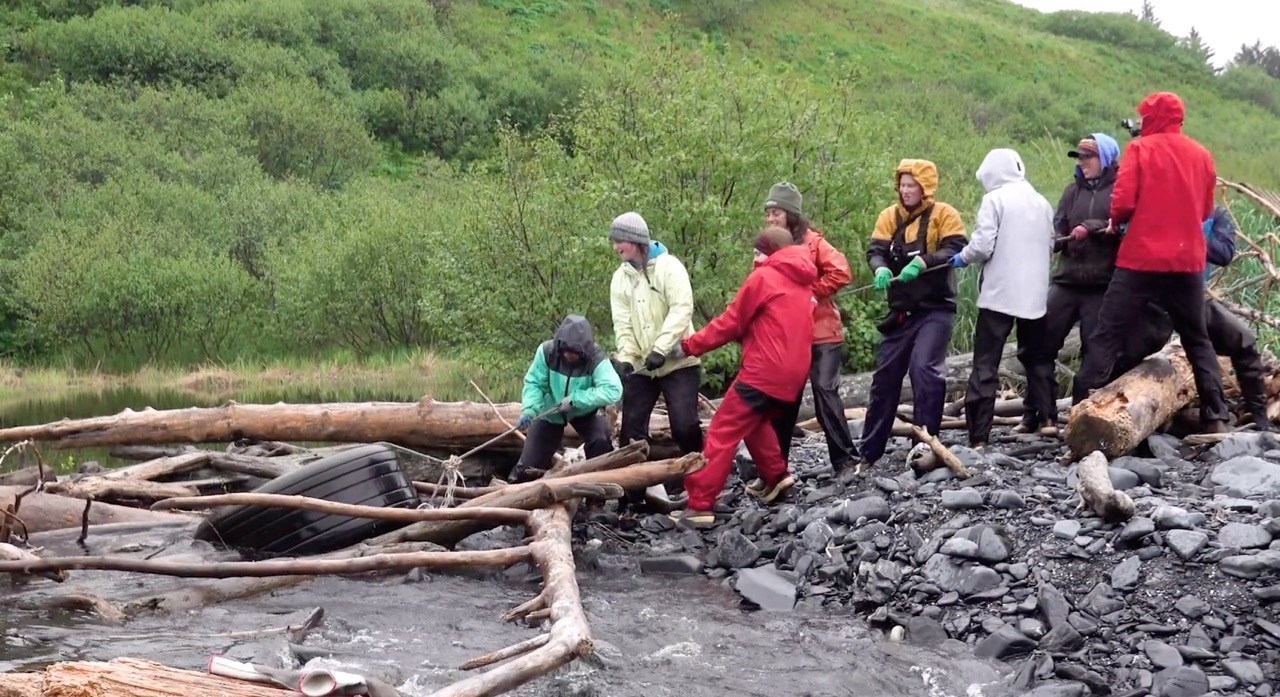 Max Romey holds a small plastic duck above a backdrop of one of his watercolor works. Taken from If You Give a Beach a Bottle/Max Romey
Max Romey holds a small plastic duck above a backdrop of one of his watercolor works. Taken from If You Give a Beach a Bottle/Max Romey
The MY HERO Project is pleased to announce that the winner of the 2024 Sylvia Earle Ocean Conservation Award is If You Give a Beach a Bottle by Max Romey. This annual award is presented to filmmakers who use film to highlight ocean heroes and inspire others to take action and protect the oceans across the globe.
If You Give a Beach a Bottle is a call to action. Inspired by the picture books he read as a child, Romey used his skills as a watercolor artist to tell the story of a beach clean-up he attended on a remote coastline of Alaska. Romey’s artwork is striking but is accompanied by shocking footage of piles of debris that the team collected, even from one of the quietest corners of the ocean. However, Romey argues, the picture might not look so troubling for future generations, if we act now.
MY HERO interviewed Max about what inspired him to create If You Give a Beach a Bottle.
Tell us a bit about yourself.
I'm here in Anchorage, Alaska and I'm currently working on my next film, which is kind of in the same genre and the same subject. We just finished one called Footprints on Katmai, which kind of touches on a lot of the same things. I'll hopefully be working on another marine debris film here soon, because it's just one of those issues that I'll probably be telling stories about for the next 50 years at least.
What drew you to making this film?
What drew me to this film, and why I think it's so important is it's one of those things I had a really hard time understanding. Ocean plastics, marine debris, and just the full scale of everything is enormous. I couldn't really put it into words and that's usually where a lot of my films come from, is when I don't see something out there. It's like when you're in a classroom and one person raises their hand to ask a question that the other ten were thinking. It's kind of the same with films. Sometimes when you don't see something out there, it's because somebody should make it.
I think one of the most important things about this film is it just shows a creative way to understand this really complex topic. Every time I hear another article about ocean plastics ending up in babies or animals or something like that it just makes you want to zip on to something a bit more light-hearted, so that was the goal of this film; to make something that was fun, watchable, but also very educational. Kind of like hiding broccoli in a smoothie.
How did the idea for the film arise?
The idea for the film came from my childhood. I grew up dyslexic, reading and writing have always been very difficult for me, and the picture books in my life were really the inspiration. I love picture books; you just get it. You can read the words if you have to, but I just love flipping through them. There were a couple like If You Give a Moose a Muffin or If You Give a Mouse a Cookie, so that’s where the idea for If You Give a Beach a Bottle came from to explain this big, complex, interconnected story.
Did you face any challenges in creating the film?
The challenges of making a film like this are, one, just filming in Alaska. Alaska is rather unforgiving when it comes to everything, especially weather, and especially being in these wild places. There was a couple of cameras lost to things like salt water and filming in these rough environments in this case. Also just trying to navigate filming with bears in mind that has safety issues. I was filming a lot, but also, I was a full member of the crew doing this clean-up, so that's picking up a whole lot of debris and stacking all of that together. Putting the film together was almost the easy part compared to trying to try to capture everything.
 Taken from If You Give a Beach a Bottle/Max RomeyThe beach clean-up team work together to pull a tire that's become stuck on the coastline.
Taken from If You Give a Beach a Bottle/Max RomeyThe beach clean-up team work together to pull a tire that's become stuck on the coastline.
What are the successes of this film?
For me, it's a success because when kids see it, when adults see it, when people who know nothing about ocean plastics or Alaska or any of these big complex ideas see it, they get it. And that's to me what matters, because I think artists and creatives play a huge role in in a lot of these solutions. You need the scientists, you need the engineers, of course you need people who are actually going to do the work. But sometimes you need somebody who can inspire that as well. And I think that that is the role of artists in all of this, is to feel it all, soak it all in, and then be able to take those really big, complex, crazy, kind of uncomfortable topics and make them into something we can see and understand, maybe laugh a little bit at, but then ultimately inspire that generation who will come up with solutions in their own way.
I do think that’s going to happen through a million tiny different solutions when it comes to the ocean or the problems facing it. There is absolutely no one solution because there's no one problem. There are millions of tiny problems that all add up to one big one, and the solution is going to be the same way.
Who made this film possible?
I think the people that made it possible are a lot of the people in it. It’s the captain of the boat who let me on, it's engineers who were really patient and explained all these big processes, fact checked and approved. And so this is really a film made by the people that it's about for the people that will be inspired for it.
Do you have a personal mentor or hero?
It’s hard to narrow that down to one. I feel like there are so many people who have made what I do possible. Like growing up dyslexic, it's hard. And having people who are there to support me has made all the difference. Everybody who both encouraged me to get into art and then stick with it. My grandmother was an unbelievable artist, and she was a really big inspiration. She's the one who taught me how to paint and sketch.
And then, of course, all of the people that you meet along the way who are finding their own small solutions in their own way and tackling them one by one. I mean, those are the real heroes. I really do think it's so hard to name one because everybody can be a little bit of that hero in their own life.
On winning the Sylvia Earle Ocean Conservation Award, Romey added:
It just means the world to be able to share that film, and that inspiration, and I can't wait to see where people go with it. So, thank you so much!
About the Sylvia Earle Ocean Conservation Award
MacGillivray-Freeman Films Educational Foundation’s One World One Ocean Campaign sponsors the ‘Sylvia Earle Ocean Conservation Award’ annually at the MY HERO International Film Festival. One World One Ocean is a global non-profit campaign designed to connect people emotionally to the world's ocean. Their mission is to raise awareness of ocean degradation, to inspire audiences through cinematography and to spark a global movement to protect our seas.
Sylvia Earle is a world-renowned oceanographer, explorer, author, lecturer, leader, and research scientist who has led more than 70 expeditions, logging more than 6,500 hours underwater. Formally chief scientist of NOAA and now a National Geographic explorer-in-residence, she was awarded the 2009 TED Prize for her proposal to establish a global network of marine protected areas, called “hope spots.”
Said Greg MacGillivray, Chairman of MacGillivray Freeman Films, “Sylvia Earle is our ocean hero, and we hope this award inspires aspiring filmmakers to shine a spotlight on other dedicated people from all walks of life who are working tirelessly on behalf of our oceans."
Read more about the award, and its sponsors, here.
To see previous winners of the MY HERO Sylvia Earle Ocean Conservation Award, or enter for 2025, go to: myhero.com/sylvia-earle-ocean-conservation-award
About the MY HERO International Film Festival:
The My Hero Film Festival is an annual event dedicated to showcasing films that celebrate the power of the human spirit. The festival provides a platform for filmmakers to share inspirational stories of everyday heroes. Thanks to generous sponsors, prizes are awarded to elementary, middle school, high school, college and professionals in a variety of categories including documentary, narrative, music video, animation, experimental, and more.
The festival aims to inspire audiences to recognize the heroism in their own lives and encourage positive actions in their communities. Learn more.
The MY HERO International Film Festival was celebrated on November 16, 6pm @ the Ann and Jerry Moss Theater at New Roads School in Santa Monica, California. Find out more HERE.
Page created on 7/1/2024 4:41:24 PM
Last edited 10/7/2025 4:18:11 PM
